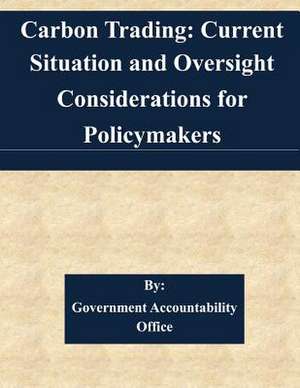Carbon Trading
Autor Government Accountability Office (U S ), Government Accountability Officeen Limba Engleză Paperback
Preț: 82.97 lei
Nou
Puncte Express: 124
Preț estimativ în valută:
15.88€ • 17.26$ • 13.35£
15.88€ • 17.26$ • 13.35£
Carte disponibilă
Livrare economică 31 martie-14 aprilie
Preluare comenzi: 021 569.72.76
Specificații
ISBN-13: 9781511527200
ISBN-10: 151152720X
Pagini: 48
Dimensiuni: 216 x 279 x 3 mm
Greutate: 0.14 kg
Editura: CREATESPACE
ISBN-10: 151152720X
Pagini: 48
Dimensiuni: 216 x 279 x 3 mm
Greutate: 0.14 kg
Editura: CREATESPACE
